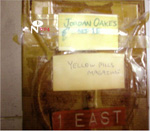Shop Around 20

The Numero Group is a bespoke salvage operation, operating out of Chicago, and run by music obsessives Tom Lunt and Ken Shipley. Quite rightly they invest a lot of love into creating beautiful objects, with detailed booklets, loads of photos. And best of all consistently themed, generic packaging. Now I’m a real sucker for that sort of thing. You get it a lot with books like the Penguin Classics, or the Rebel Inc Classics series but it’s frustratingly rare with records. Though, in fairness, Ze, Impulse!, Kent, Blood and Fire, and Soul Jazz are honourable exceptions.
The Numero Group is running a wonderfully named Eccentric Soul series, focussing on lost local soul/funk labels from the ‘60s and ‘70s. So far the spotlight’s been on Capsoul from Columbus, Ohio, and Bandit from Chicago, and the music’s sensationally uplifting and in turn raises wonderful questions about just how much amazing music was produced by local independent soul/funk labels at this time. Quite simply if you like your old soul and funk stuff, you’ll love these sets.
My own favourite Numero release is the salvaged set of Camino Del Sol by Antena, with lots of lovely extras. Think Astrid Gilberto and Tom Jobim doing Suicide’s Be Bop Kid or Cheree, throw in Francoise Hardy and the Marine Girls, and you will be in the area covered by these young French explorers at the start of the ‘80s. These frail sounds are utterly heartwarming and deliciously danceable. Originally released on the excellent Crepescule label, it all ties into a great story about the adventuresomeness beyond punk on the European mainland think of LiliPUT, Malaria!, Marine for starters.
Antena’s story like so many others of the time is a tragic tale of false starts and unrealised potential, nonchalance and a blatant disregard for the rules of the game. I loved their 'Be Pop single madly, and it was almost a manifesto for years. It thankfully has been salvaged by our old friends at LTM, as part of their series of Isabel Antena reissues. These are well worth investigating after indulging in the glories of Camino Del Sol, though the first En Cavale is very much of its time. With the ubiquitous Camelle Hinds on bass, Danny Cummings on percussion, and Martin Hayles (of Orange Juice fame) at the controls, it’s pleasantly funky, lightly latin-esque new pop. The 1987 follow-up Hoping For Love is more jazzy, and all the better for it.
The most recent Numero Group release is perhaps the most fascinating. It’s a double CD compilation of lost power pop gems, put together by Jordan Oakes of Yellow Pills notoriety. I say notoriety but the name meant nothing to me. Power pop is not exactly my thing. I do envy people like Jordan though who have this fundamentalist zeal for a particular type of music, a very specifically defined field, and off they go digging deeper and deeper for buried treasure.

But power pop? Well, Jordan talks a good talk. “Power pop is a thousand songs,” he says. “It gives you something to dream about while you listen. When you’re lost in a great tune that chill up your spine is telling you something: yes, you ARE better than everybody else. At least for three minutes or so.” You can’t say fairer than that can you?
And there’s plenty of great tunes here, including a couple of numbers from the Colors, the New York outfit Robert Vickers played with before joining the Go-Betweens. And Jordan doesn’t even mention that Robert was in the group! Now that’s single-minded vision. It also shows what matters to different audiences. Myself, I’ll never forget when Robert appeared in the Go-Betweens in 1983. I saw them then at The Venue in Victoria, playing with Felt and The Smiths, and they blew everyone else away. Robert looked like an angelic mod upstart, and the group was first airing the set of songs that would become Springhill Fair too far down the line. I still have the postcard from Morrissey inviting me along to the show.
Anyway, Jordan mentions the Bongos in his sleevenotes, which is interesting as I had been digging out their old releases from the great Fetish label in the early ‘80s. The Bongos always seemed a bit out of place on a label better known for its Neville Brody sleeves and for releases from Clock DVA, 23 Skidoo, Lydia Lunch and Throbbing Gristle, but pop is pop. And I bet The Bongos were the only power pop outfit to have members of Clock DVA and Throbbing Gristle guest on its records! The Bongos leant as close to the Feelies as the Shoes, which maybe sets them apart, but if you like power pop go seek out their Drums Along The Hudson set, which still seems to be available.
I can’t wait to discover where the Numero Group will go next. In the meantime, check out the website at www.numerogroup.com and order copies of the entire catologue. The CDs are terrific value if purchased through the site, and mine have been promptly delivered. Such devotion to duty needs to be rewarded!
© 2005 John Carney